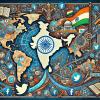Riding the Technological Wave: India's Digital Diplomacy and Global Engagements
In the 1850s, upon receiving the first telegraph messages, the flummoxed British Prime Minister and Foreign Secretary, Lord Palmerston, famously exclaimed, "My God, this is the end of diplomacy!" His reaction reflected the skepticism and surprise that often accompany shifts in public diplomacy. As technology continues to evolve, it increasingly overshadows traditional forms of diplomacy, which are now often viewed as relics of the past.







